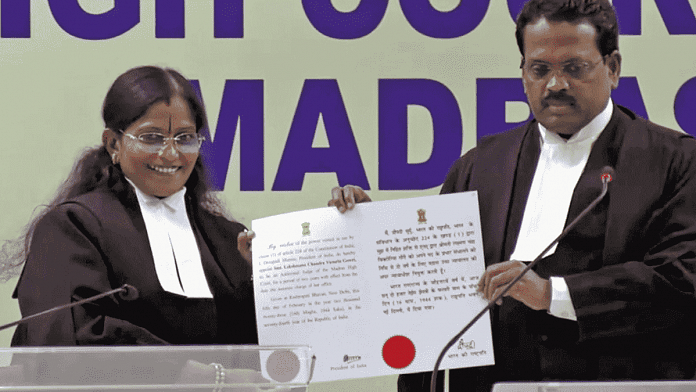New Delhi: Giving reasons for its refusal to interfere with the appointment of L. Victoria Gowri as an additional judge of the Madras High Court, the Supreme Court said, “A judge is judged everyday”.
The SC collegium had recommended Gowri’s elevation to the Madras HC on 17 January. However, her appointment has been controversial. Lawyers from the Madras HC had written to Chief Justice of India D.Y. Chandrachud, seeking recall of the recommendation, alleging that she made ‘hate speeches’ against Christians and Muslims. Two petitions were then filed in the Supreme Court, including one by senior advocate R. Vaigai, challenging the recommendation for her elevation.
The SC Tuesday refused to interfere with Gowri’s appointment, saying that the political affiliation of a candidate or public expression of his or her views does not impact their work as a judge. The remarks were made after some lawyers said that Gowri had links to the Bharatiya Janata Party (BJP). Gowri took oath as an additional judge of the Madras HC Tuesday.
Detailed reasons for the refusal were made public Friday.
In its judgment released on the day, the bench referred to judgments which differentiate between the eligibility of a candidate for evaluation, from the evaluation of the worth and merit of a candidate. Citing these judgments, it pointed out that the court has ruled that while the court can look into the eligibility of a candidate, the question whether a person is fit to be appointed as a judge involves the aspect of suitability and stands excluded from the purview of judicial review.
The petitioners had also told the court that the SC collegium’s decision to recommend her name was not an informed one since the material related to her hate speeches was not placed before it.
However, Friday’s judgment rejected the argument that some of the facts were not known and considered by the collegium, while explaining the process adopted by the collegium when it considers a person’s name for appointment to the HC.
The court asserted that while exercising judicial review, it cannot quash the recommendation or ask the Collegium to reconsider its decision. “To do so would violate the law as declared, as it would amount to evaluating and substituting the decision of the Collegium, with individual or personal opinion on the suitability and merits of the person.”
Also Read: From BJP leader & Hindutva activist to Madras HC judge — who is L Victoria Gowri
Question on “suitability or merit of candidate”
In the judgment delivered Friday, the court asserted that the question before it related to the scope and ambit of judicial review on appointment of judges to the high courts under Article 217 of the Constitution.
The petitioners before the court had relied on a 1992 judgment, through which the Supreme Court had restrained judge K.N. Srivastava from taking oath as a judge of the Gauhati High Court. This was the only incident when the Supreme Court had quashed the appointment of an HC judge. This was done after the court found that Srivastava did not fulfill the basic eligibility criteria under Article 217 of the Constitution, since he had never practised as an advocate and had never held a judicial office.
While there were corruption and misappropriation of funds allegations against Srivastava, the court restricted its judgment on the issue of him being eligible under the Constitution.
However, the SC now asserted that the 1992 judgment would not apply to the case at hand, because the question before it was on the “suitability or merit of the candidate”.
The bench also pointed out that Justice Gowri has been elevated as an additional judge of the Madras HC. It then asserted, “On taking oath, the person pledges to work as a judge to uphold the Constitution and the laws. Article 51A8 of the Constitution casts an obligation on every citizen, and more so on every judge, to promote harmony, spirit of common brotherhood among all transcending religious, linguistic, regional or sectional diversities.”
“Not only is the conduct and judgments delivered considered at the time of confirmation, a judge is judged everyday by the lawyers, litigants and the public, as the courts are open and the judges speak by giving reasons in writing for their decisions,” it added.
(Edited by Zinnia Ray Chaudhuri)
Also Read: Here are SC, HC judges with political pasts. Gowri’s unconstitutional views were the problem



